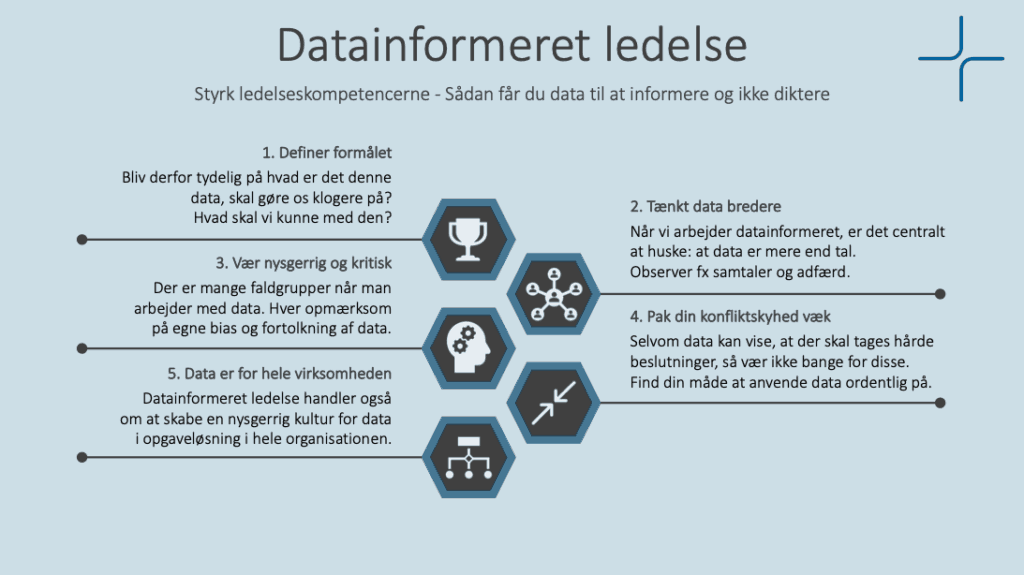Use data to inform not dictate
- Five points of attention for working with data-informed management
Working with data-informed management requires a number of considerations to ensure that data is used wisely. See which five points you need to pay special attention to when using data in decision-making processes in the figure below.
1. Be clear on the purpose of data
When you start thinking about data-informed management, it's crucial to consider what data you actually need. We tend to count things just because we can, rather than counting what's important.
Therefore, get clear on what this data is supposed to tell us. You can do this by asking yourself:
- What will the data tell us?
- What is the purpose of collecting data?
- What decisions should we be able to make when the data is ready?
Only when this is clear can you start thinking about how to collect data.

2. Think data more broadly
For many, data is equated with numbers. When working in a data-informed way, it's important to remember that data can be more or less everything. Therefore, always make sure to think about data more broadly.
All kinds of data - such as conversations, behavior, external and internal communication - are important to both identify and use, so that it's not just the "easy" and easily comparable numbers we make decisions based on. Every organization has a lot of readily available amounts and types of data just waiting to be collected, organized and used.
Always make sure to collect data systematically when using it to make decisions - no matter what type of data you've chosen to collect.
3. Be curious and critical
When being informed by both data and knowledge, it is important to be both curious and critical of what you are presented with. For example, who collected the data or results you are presented with and for what purpose?
In other words, it's about being curious and proactive when it comes to collecting data, and it's also very much about being able to analyze, reflect on and judge a given issue.
It is therefore important to be aware of the classic pitfalls when using data. For example, how do you look critically at your own data before turning it into knowledge? It's difficult and there are many unconscious biases that can hinder our thinking. For example, we are easily inclined to be less critical if the amount of data underlines a hypothesis we already have or draws a pattern we agree with. Therefore, we need to work systematically (as mentioned in attention point 1) and force ourselves to be critical - because unfortunately, the brain is a lazy-Lars that doesn't necessarily do it on its own.
READ MORE ABOUT OUR EDUCATION
LEAD
offers certification in the development of agile leadership with the development tool The Leader's Versatility Index (LVI)
With a certification, you will be equipped to use LVI in development processes in your organization at the individual, group and organizational level.
4. Pack away your conflict aversion
A survey of 858 Scandinavian managers shows that many managers tend to be more supportive than directive in their leadership style. 59% of leaders are rated as being "too little" direct when they are dissatisfied with a performance, and 57% are rated as holding people "too little" accountable and therefore - perhaps in a misguided attempt to be decent or slightly conflict-averse - risk being too nice (Data pull on LVI360, LEAD & Kaiser Leadership, 2018). The risk of this, however, is that you end up not using your data to make the hard and difficult decisions.
Therefore, as a leader, you need to consider when faced with this: "How can I have this conversation/gather this data/give this data meaning/make this decision in a way that doesn't compromise my values of decency?"
The underlying point here is that a decency value should never become an excuse to do nothing.
We can almost certainly say that this is a development arena for most managers, where there is a lot to learn if you consider it a constructive development arena that also ensures a better solution to the core task because you get the necessary decisions made.
5. Data-informed leadership is not just for the leader - but for the overall culture
Data-informed leadership is not just about being able to make wise managerial decisions based on data - it's also about creating a culture in the rest of the organization that focuses on collecting, evaluating and using data (see Bäckström & Kjeldsen, 2018). It is thus also the task of management to stimulate curiosity, reflection and critical thinking throughout the organization so that everyone becomes sharp at both identifying data and using it actively in their work and daily practice. Such an evaluative learning culture can both contribute to a stronger basis for decision-making and ensure that we work with or develop what is relevant and adds value in the given situation.
As a leader, consider the elements in the points below to co-create a data-driven culture.

Data-informed management is part of the toolbox
To succeed with data-informed management, it's not enough to simply be able to collect the right data.
The entire management toolbox is essential to succeed with data-informed management. For example, you can't assume that just because you're working in a data-informed way, everyone will run in the same direction: "because that's what our data shows is the best decision". It takes a lot of data-informed leadership and then change management to bring knowledge into play and develop or change the behaviors and practices that may need to be adjusted. Similarly, it also requires process management skills, paradox management skills, strategic skills and much more - data-informed leadership never stands alone as a leadership skill in the toolbox.




